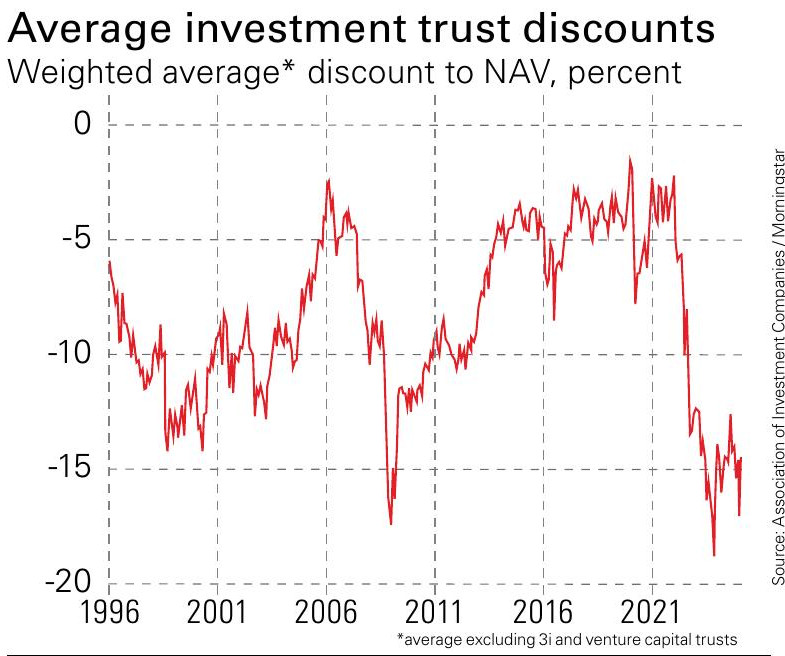MoneyWeek is not dogmatic about how we invest. Passive funds, active funds, UK stocks, international stocks – all these and more should be on the table. Still, we tend to have a bias towards investment trusts rather than open-ended funds in our funds coverage. This is partly because investment trusts get a lot less attention than open-ended funds, and we can add more value by focusing on them, but also because we feel that there are certain structural benefits to closed-end funds for many types of investing.
Some of the supposed advantages of trusts are less compelling for me than other investors think. Yes, it’s great to be able to buy at a temporary discount to net asset value (NAV), but it’s less compelling if discounts are still wide when you sell. The issue of persistent discounts has become an existential issue for the sector (see chart). The ability to use gearing (borrowing to invest) can boost returns in principle, but gearing plus poor management equals bigger losses.

(Image credit: Unknown)
Closed-end structures are unequivocally best for alternative assets and for more illiquid markets. For highly liquid assets – eg, large-cap, developed-markets stocks – there’s less advantage. For example, earlier this month I met with the Guinness European Equity Income Fund – a quality-income fund with a solid record and a clear process. Even though I usually favour trusts, I’d be happy to choose it as a Europe fund. Or take STS Global Income & Growth Trust (LSE: STS), whose managers run the same portfolio in the open-ended Trojan Global Income Fund. I’d probably buy the trust, but I’d view the open-ended fund as an equally good choice for a defensive equity fund with low US exposure.
Sign up to Money Morning
Don’t miss the latest investment and personal finances news, market analysis, plus money-saving tips with our free twice-daily newsletter
Don’t miss the latest investment and personal finances news, market analysis, plus money-saving tips with our free twice-daily newsletter
A USP for investment trusts
Still, there is one structural benefit of trusts that is often overlooked. An open-ended fund is controlled by the fund manager. An investment trust is an independent entity. It has its own board, which is supposed to look out for shareholders, and can sack the manager if they are doing a bad job (some boards are much diligent than others). So, like all companies, they must hold annual general meetings, where investors get an update from the manager. If you go to these, you will often hear plenty of excellent questions from very engaged investors who have their own money on the line.
Encouragingly, many trusts clearly see that AGMs are a chance to present themselves to potential investors, and not just a regulatory requirement. Recently I was at the AGM for India Capital Growth Fund (LSE: IGC), one of MoneyWeek’s favourite long-term plays on India. It previously held its meetings in Guernsey, but shifted to London and saw a strong turnout. This week, I should be at the Vietnam Enterprise Investments (LSE: VEIL) forum at its AGM (you can register to attend here). In an environment where many trusts will face a growing threat from active ETFs (which will not be holding AGMs), this is a unique selling point that more should capitalise on.
This article was first published in MoneyWeek’s magazine. Enjoy exclusive early access to news, opinion and analysis from our team of financial experts with a MoneyWeek subscription.





